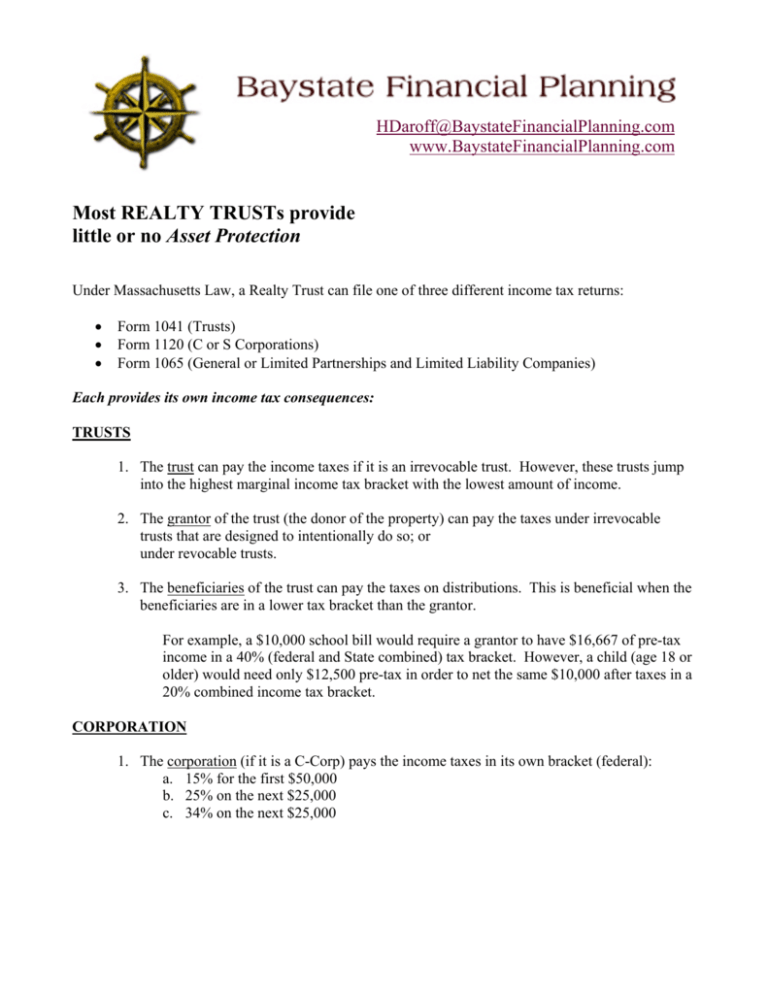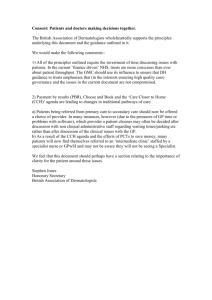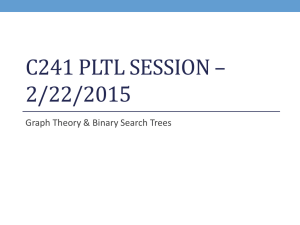
HDaroff@BaystateFinancialPlanning.com
www.BaystateFinancialPlanning.com
Most REALTY TRUSTs provide
little or no Asset Protection
Under Massachusetts Law, a Realty Trust can file one of three different income tax returns:
•
•
•
Form 1041 (Trusts)
Form 1120 (C or S Corporations)
Form 1065 (General or Limited Partnerships and Limited Liability Companies)
Each provides its own income tax consequences:
TRUSTS
1. The trust can pay the income taxes if it is an irrevocable trust. However, these trusts jump
into the highest marginal income tax bracket with the lowest amount of income.
2. The grantor of the trust (the donor of the property) can pay the taxes under irrevocable
trusts that are designed to intentionally do so; or
under revocable trusts.
3. The beneficiaries of the trust can pay the taxes on distributions. This is beneficial when the
beneficiaries are in a lower tax bracket than the grantor.
For example, a $10,000 school bill would require a grantor to have $16,667 of pre-tax
income in a 40% (federal and State combined) tax bracket. However, a child (age 18 or
older) would need only $12,500 pre-tax in order to net the same $10,000 after taxes in a
20% combined income tax bracket.
CORPORATION
1. The corporation (if it is a C-Corp) pays the income taxes in its own bracket (federal):
a. 15% for the first $50,000
b. 25% on the next $25,000
c. 34% on the next $25,000
HDaroff@BaystateFinancialPlanning.com
www.BaystateFinancialPlanning.com
effectively:
15.00% on $ 50,000
18.33% on $ 75,000
22.25% on $100,000
plus State income taxes.
2. The owners (if it is an S-Corp) pay the taxes in their own individual bracket.
PARTNERSHIP OR LLC
1. The owners pay the taxes.
Each also provides varying degrees of asset protection.
TRUSTS
1. Most trusts provide minimal if any protection from creditors (predators)
a. Self-Settled Trusts (you create for you) have less protection than
b. Third-Party Trusts (created for you by someone else).
2. Asset Protection Trusts can be off-shore or on-shore with some States (e.g., Delaware,
Alaska, and others) providing greater protection than others.
CORPORATIONS
1. If you maintain separate business records, then the owners have limited liability.
2. Creditors of the corporation still have access to corporate assets.
PARTNERSHIPS AND LLCs
1. The partners in a General Partnership have general liability. In fact, each one is 100% liable
regardless of actual equity or income ownership (i.e., joint and several liability).
2. The general partners in a Limited Partnership have general liability. However, the limited
partners’ liability is limited to their investment in the business.
3. Both the managers and the members of a Limited Liability Company (LLC) have limited
liability.
HDaroff@BaystateFinancialPlanning.com
www.BaystateFinancialPlanning.com
There are strategies involving combinations of these enterprises.
For example:
1. Because the general partners of a Limited Partnership have general liability, a Limited
Partnership may create a Corporation to be its general partner. This creates limited liability
protection for the general partners (this was one of the motivating reasons for creating
LLCs so that only one entity could be created instead of two).
2. If multiple properties are owned in one LLC, a creditor for one property has access to the
value of all of the properties. One choice is to create multiple LLCs. However, Delaware
has a provision for a Series LLC that allows one LLC to be formed (for administrative
convenience) with subsidiaries (where each has separate asset protection).
3. Members of a Limited Liability Company have to be treated pro-rata (equally based on
their ownership interest) just like partners and stockholders. Therefore, a Limited Liability
Company may have some or all of its member interests held by one or more Irrevocable
Trusts (because trusts can “spray” income and/or principal to or for the benefit of the
beneficiaries in whatever proportions the trustees deem appropriate). This combination of
LLCs and Trusts is referred to as a Family Bank©
©
Herbert K. Daroff, J.D., CFP® 2001 all rights reserved
HDaroff@BaystateFinancialPlanning.com
www.BaystateFinancialPlanning.com
The contents of this article are intended for education purposes only.
The article provides a brief summary based on our understanding and interpretation of current law.
All tax references are to federal tax law only, unless otherwise stated.
This presentation includes changes made by the 2001 Tax Act.
All these changes are to expire at the end of 2010.
Pursuant to IRS Circular 230:
The information contained in this material is not intended to, and cannot be used to, avoid IRS penalties.
This material supports the marketing and promotion of life insurance.
Seek advice based on your particular circumstances from independent
tax, legal, accounting, insurance, investment, and financial advisors.
Individuals, including business owners, should not apply any of these concepts without coordinating with
attorneys, accountants, life insurance agents, investment advisors, financial planners, etc.
Consult with your professional tax advisor about your personal situation before making any decisions.
This is not intended to provide tax or legal advice.
Advisors should not apply any of these concepts to their clients without:
(1) establishing a mutually agreed upon scope of their engagement;
(2) gathering necessary and sufficient objective and subjective data given the client’s goals, needs, and priorities; and
(3) evaluating that data and determining alternative strategies consistent with the mutually agreed upon scope of the
engagement and the data collected.
Herbert K. Daroff, J.D., CFP® is a Registered Investment Advisor in Massachusetts
doing business as BAYSTATE FINANCIAL PLANNING.







